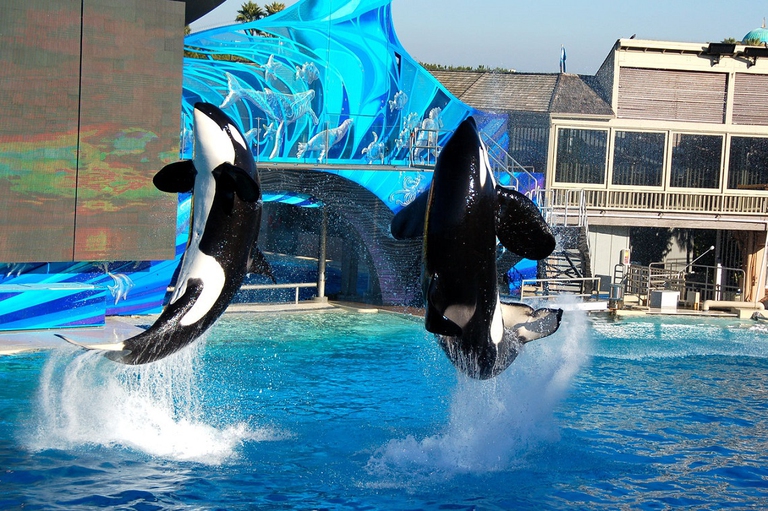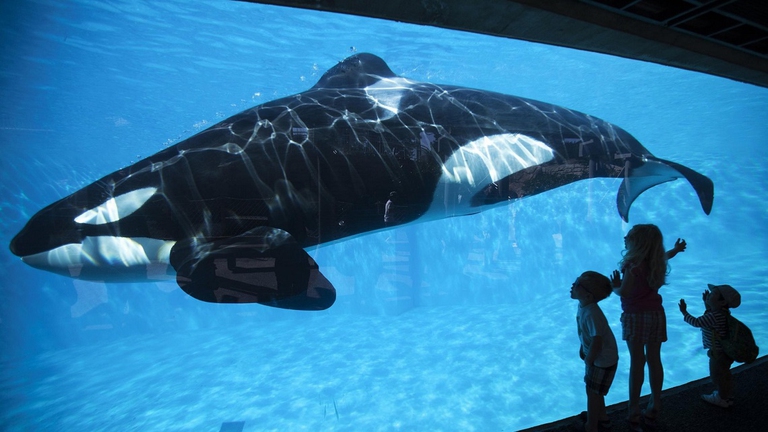
South African court dismisses a major lawsuit by 140,000 Zambian women and children against Anglo American for Kabwe lead poisoning. A setback for affected communities enduring the lasting impact of lead contamination.
Il parco di San Diego ha annunciato che dal 2017 intende eliminare gradualmente gli spettacoli che vedono coinvolte le orche.
Killer whales (Orcinus orca), like all cetaceans, are sensitive, smart, and social creatures. Considering that in the wild orca whales live in packs of up to 40 individuals, imprisoning and forcing them to perform in shows just for human entertainment is an act of unacceptable cruelty. Held in small pools, orca whales physically lose energy and strength and end up going crazy, becoming aggressive and dangerous to instructors.
People’s awareness on the exploitation of these large marine mammals has significantly increased due to Blackfish, documentary launched in 2013 that – through the story of Tilikum, an individual of killer whale kept in captivity that killed 3 people – denounces the mistreatments to orca whales in water parks.
Public’s indignation due to the movie has inevitably involved marine parks using orca whales in their shows.
The water park SeaWorld of San Diego has announced that it will gradually end orca shows as of 2017. After the documentary, which showed cruelties against killer whales and other animals, SeaWorld’s stocks dropped, passing from 39 dollars in 2013 to 18.
Joel Manby, SeaWorld CEO, said that the decision of ending orca shows comes following protests and the significant slippage in visitors. The decision also comes after that a legislator proposed a draft law to ban live shows and captivity breeding of orca whales in California.
“Orca whales will be involved in activities in line with their nature and behaviours,” said Manby. However, it is not clear what that means and seems that captivity will continue. Moreover, nothing has been said on SeaWorld’s other parks in the US.
According to scientists, orca whales have developed a part of the brain that humans still haven’t: it is about emotions and awareness. Who knows how these beautiful animals pity us, considering us pathetically sterile, whilst we admire them swimming and jumping in small prisons.
Siamo anche su WhatsApp. Segui il canale ufficiale LifeGate per restare aggiornata, aggiornato sulle ultime notizie e sulle nostre attività.
![]()
Quest'opera è distribuita con Licenza Creative Commons Attribuzione - Non commerciale - Non opere derivate 4.0 Internazionale.
South African court dismisses a major lawsuit by 140,000 Zambian women and children against Anglo American for Kabwe lead poisoning. A setback for affected communities enduring the lasting impact of lead contamination.
Controversial African land deals by Blue Carbon face skepticism regarding their environmental impact and doubts about the company’s track record, raising concerns about potential divergence from authentic environmental initiatives.
Majuli, the world’s largest river island in Assam State of India is quickly disappearing into the Brahmaputra river due to soil erosion.
Food imported into the EU aren’t subject to the same production standards as European food. The introduction of mirror clauses would ensure reciprocity while also encouraging the agroecological transition.
Sikkim is a hilly State in north-east India. Surrounded by villages that attracts outsiders thanks to its soothing calmness and natural beauty.
Sikkim, one of the smallest states in India has made it mandatory for new mothers to plant saplings and protect them like their children to save environment
Chilekwa Mumba is a Zambian is an environmental activist and community organizer. He is known for having organized a successful lawsuit against UK-based mining companies.
What led to the Fukushima water release, and what are the impacts of one of the most controversial decisions of the post-nuclear disaster clean-up effort?
Nzambi Matee is a Kenyan engineer who produces sustainable low-cost construction materials made of recycled plastic waste with the aim of addressing plastic pollution and affordable housing.









